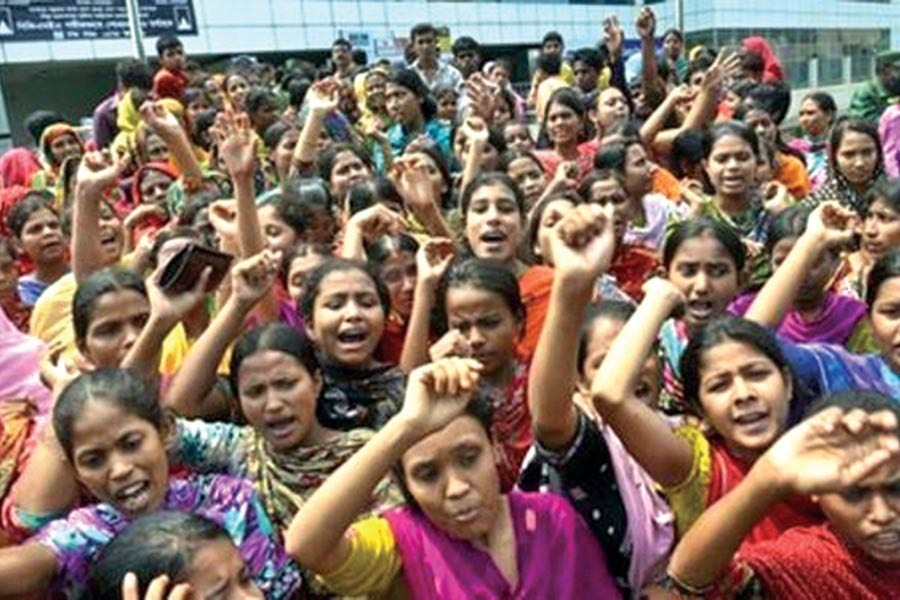It is rather unfortunate that all the relevant parties are yet to find a decent mechanism to fix wages for workers employed in the apparel industry, the largest and the most important export earner for the country.
Barring the readymade garment (RMG) sub-sector, the country does very rarely encounter any major labour trouble these days. Workers of some other sectors at times issue threats of work-abstention programmes or enforce the same. But the problems, in most cases, are solved within a very short time and those hardly cause any major disruption to normal life of the citizens.
Gone are the days when labour trouble had been a recurrent and very common event in most state-owned mills and factories, particularly in jute and textile units. With the private sector assuming greater responsibility in the manufacturing sector, the labour situation has remarkably improved. But this can hardly be true in the case of the export-oriented apparel sector. Troubles over wages have been rather regular events in the RMG factories. Workers do very often take to the streets to vent their resentment over poor wages or irregular payments. Workers also on occasions resort to violence.
Even some years back, there was no wage structure for RMG workers who were entirely dependent on the whims of the factory owners. But as the industry became the number one player in the country's economy, the government felt the need for safeguarding the interests of hundreds of thousands of workers employed in it and made legal provision for constituting wage board to revise their wages at regular intervals. The government under the labour law does also constitute wage boards for workers employed in some other sectors from time to time.
It is generally observed that there exists a gap between the workers' demands on wages and other benefits and the owners' willingness to meet those. Hard bargaining over workers' demands is a very usual development. Disagreement, on occasions, leads to workers' agitation. But, barring the RMG, such troubles have been very few.
However, troubles over wage are very common in the RMG industry. The government's intervention through the formation of wage board has failed to ease the situation because of the fact that the gap between the workers' expectations and the RMG owners' willingness or ability to fulfil the same is very wide.
For instance, the latest wage board for RMG workers has fixed the gross wage at the entry point at Tk 8,000 per month. Earlier, it was Tk 5,300. The hike though appears big, it is far too meagre to support a decent living.
The RMG factory owners initially were reluctant to implement the latest wage-board recommendations on the ground of their lack of 'affordability'. However, coming under the pressure from highest level of the government and on receipt of some fiscal incentives, they agreed to implement the new wage structure.
The government has substantially reduced the export duty at source and corporate tax for the RMG sector.
The RMG workers had demanded a minimum wage at Tk 16,000 per month. But they are to remain content with half of that amount since the RMG owners were not willing to implement even the minimum wage fixed by the latest wage board.
Notwithstanding the fact that the wages recommended by the government body are not enough to make a living, RMG workers have accepted it as a fait accompli since they hardly had any true role in the decision-making process.
But there are certain flaws in fixation of wages by the government committee concerned. Workers belonging to at least three grades had protested the way their wages were fixed. In the case of certain grade, workers saw decrease in their actual wage. Moreover, the basic pay under some grades increased very nominally that affected the rates of festival bonus and overtime payments.
Neither the government nor the RMG factory owners initially took the workers' resentment seriously and tried to address the relevant issues in a usual manner. It is hard to blame the workers for being angry if they see their wages have declined as per recommendations of a wage board that is supposed to hike the same!
However, a committee, formed by the government in the wake of ongoing workers' agitation to look into the RMG wages, has agreed in principle to remove anomalies in basic pay of three grades.
The latest move is welcome. But it does appear that the problems concerning RMG workers' wages are difficult ones and those would continue to trouble the sector in the future also. It would not be wise for the RMG factory owners to avoid the 'decent' wage issue on the ground of 'lack of affordability'.
It is quite evident that a good number of apparel units enjoying international reputation could easily afford higher wages for their workers. But many others, however, find it hard to afford even the minimum ones. So, affordability varies and the workers of quality RMG units get deprived of their due because of others' ill-affordability.
Until now the government and the trade bodies in the apparel sector have not gone deep into the wages issues. But to avoid recurrence of the problems over wages, they should examine the same seriously and find appropriate solution.


